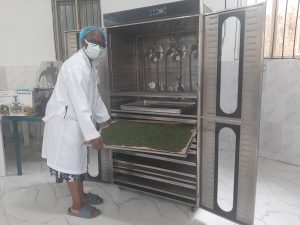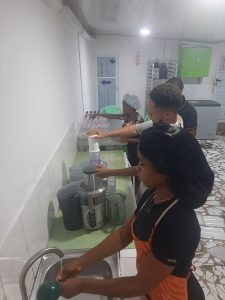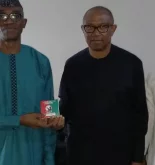By Abasiodiong Udosen
PREFACE: In the first part of this series, we shared the untold stories of small and medium-scale entrepreneurs in Akwa Ibom, shedding light on the daunting challenges they face in growing their businesses and achieving sustainable profitability. Now, in this second part, we turn our focus to a state-driven initiative that is reshaping the narrative for these business owners and unlocking new opportunities, driving growth, and fostering long-term success. Let’s dive into how a government-driven initiative is making a difference and what it means for the future of entrepreneurship in the state.
How one man’s vision created opportunities for many
As preparations for Akwa Ibom State’s 36th anniversary approached, Governor Umo Eno, on September 12, 2023, conducted an inspection of the newly renovated E-Library along IBB Way. The facility was set to become a vibrant hub for local innovation and commerce.
As Governor Eno walked the E-Library premises, he shared his vision for the space to journalists who accompanied him. According to him, the renovated complex would soon become a place where entrepreneurship and leadership would thrive.
Not only would the facility host the pioneer Made in Akwa Ibom Trade Fair, but it would also house the government’s new Entrepreneurial and Leadership School, intended to nurture a new generation of skilled, business-savvy Akwa Ibomites.
“We will build the business community around this facility,” the governor explained, adding that the goal was to create an environment where entrepreneurs could launch and test their ideas before moving to larger investments at the industrial estate incubation hub.
As a businessman, Mr. Eno had long believed in “prototyping,” a concept that would allow business owners to try their products, refine them, and address any issues in a supportive environment before committing substantial resources.
Besides, he explained that the Made in Akwa Ibom Trade Fair, set to open on the 23rd, would showcase the rich talent of Akwa Ibom. From stylish fashion pieces to high-quality footwear crafted by local artisans, the event would serve as a stage for indigenous business owners to display the best of what Akwa Ibom had to offer. It was a fitting platform to celebrate local ingenuity, connect entrepreneurs with customers, and ignite a renewed passion for homegrown innovation.
In his call to action, Pastor Eno had encouraged local entrepreneurs to seize the unique opportunity to introduce their products and services to a wider market.
A trade fair that united entrepreneurs with similar challenges
Not long after it moved into the palatial E-Library complex, the management of Ibom Leadership and Entrepreneurial Development Centre called for local business owners to come and showcase their products at the inaugural Made in Akwa Ibom Trade Fair. It seemed like a typical event strewn together to mark the state’s anniversary, with little expectation that it would offer anything meaningful. At first, only a handful of entrepreneurs signed up, though skeptically.
But later, one by one, others registered – small business owners, artisans, and local manufacturers decided to take a chance. While some registered out of curiosity, others did it in a last-minute effort to gain visibility for their struggling businesses.
There was hardly anyone who thought that the decision would mark a turning point in their entrepreneurial journey. It was impossible to think that the opportunity would trigger transformations that would ripple through their businesses and reshape their lives in many ways.
You can also read – Untold Stories of Akwa Ibom’s Emerging Entrepreneurs – Part 1
Among those who stepped forward to showcase their products at the trade fair were Oduduobong Ndiok, Mitchel Chukwudi, Iyakntie Obot, Nneka John, and Alicia Etukudo. These were entrepreneurs whose stories we told in our previous report.
These five persons, drawn from the three senatorial districts of Akwa Ibom share a common problem faced by most local businesses. They were not only struggling with lack of access to larger markets for their products, they also lacked capital and the know-how to achieve sustainable growth and profitability.
Alicia, the CEO of Fresh & Natural Farms Ltd, Eket and a registered nurse and midwife, who switched to entrepreneurship, said she saw the trade fair as a powerful show of the government’s commitment to supporting local enterprises.

Alicia Etukudo, CEO of Fresh & Natural Farms, Eket working her vegetable hydration machine
“For me, it was very interesting that the governor wanted to engage directly with those of us involved in production,” Alicia said. “It was done openly, not behind closed doors. We were all invited to register, and subsequently took part in the exhibition.”
According to her, the trade fair was more than simply an event; it provided an opportunity to network with other businesses, learn about their products, and explore future collaborations.
“We had the opportunity to identify each other, our products, and see what others were doing. It provided a platform for developing relationships and going forward together.”
Continuing, she said, “It showed that this is the time to move forward, by getting entrepreneurs closer to the government and encouraging them. And for many of us, that was the first point of hope.”
Alicia was not the only entrepreneur that appreciated the opportunities the trade fair offered. Oduduobong, CEO of Papze Shoes described it as a landmark platform for Akwa Ibom entrepreneurs.
He said, “Last year’s Made in Akwa Ibom Trade Fair was a turning point for many of us because, for the first time, the governor was present. His presence drew a lot of attention, and as a result, we sold a lot of products and connected with a lot of people.”
Mitchel, CEO of Fruitzy, whose fresh fruit juice packs now line the shelves of major supermarkets and shops across the state, shared his experience at the trade fair.
According to him, it was the Uyo Chambers of Commerce and Industry that invited him to participate. But that was not all. He was allocated the number one stand at the trade fair
“There’s one thing I always tell entrepreneurs,” Mitchel began. “In whatever you do, build integrity and be consistent in quality no matter the challenges. Your integrity should speak for you, even if you’re not a native of a particular area.”
Mitchel stressed how he cultivated strong relationships with the people of the state through his products, as well as with strategic groups like the Uyo Chambers of Commerce and the Akwa Ibom Technology Incubation Centre.
“Even though I’m not an indigene, the chamber recognised the role I’ve played in the agriculture value chain, especially in large-scale fruit and vegetable production.” He expressed gratitude for the opportunity given to him, noting that the chamber was not prejudiced by his state of origin.

Mitchel Chukwudi, MD of Fruitzy, with staff during production
More than a trade fair
On September 23, 2023, the trade fair, which had become oversubscribed, was bustling. Governor Umo Eno led top officials of the state government into the E-Library grounds and the entire atmosphere changed in an instant.
“The governor is here. Pastor Umo Eno is here,” many shouted excitedly as he stepped out of his vehicle and walked through the stands to inspect some of the products on exhibition.
At the formal launch of the Trade Fair, the governor expressed admiration for the skill and craftsmanship displayed by the entrepreneurs from the state.
He also announced the donation of N250 million to Ibom Leadership and Entrepreneurial Development Center (Ibom LED), for the training and mobilisation of about 400 entrepreneurs who had registered and exhibited their products at the fair. “This is just the beginning of a long-lasting investment in our people’s ingenuity,” he declared.
Governor Eno explained that N50 million would be taken by the business school as fees paid by the state government for the registration and training of the entrepreneurial students, while N500, 000 would be disbursed as a take-off grant to each of the entrepreneurs upon the completion of their training. The grant was to help them invest and expand their businesses.
“While budgeting for the anniversary, I had cut down two hundred and fifty million. I am now donating the two hundred and fifty million to the Ibom-LED. And this is how it will be shared.
From the money that I saved from that budget, I am donating it to every one of you that registered so far. Put it at four hundred people.
“N50 million is for the school so that it can serve as their training fees. Let it be that I have paid for that. As you graduate them, if the job is for those who did not have NAFDAC Number, make sure you help them have it.
“Look at their products and let those products look good. Train them and then help them look for a market too. As you finish training them, each of them shall have N500, 000.
He said that the gesture was part of his determination to create employment in diverse ways for the people, knowing that aside government jobs or political appointments, the people can be gainfully employed through their skills.
“I am here to draw the attention of the Akwa Ibom people to this facility. This facility was built by one of our illustrious sons, Senator Godswill Akpabio when he was the Governor of the state.
“Let me thank our brother, Pastor ImoAbasi Jacob. Let me thank the DG of the Ibom LED, Mrs. Ekaette Umo, let me also thank the Senior Special Assistant on Entrepreneurial Development, Mr. Ime Uwah for transforming this place and putting our vision together.
“That we transform and restructure this place which was a former E- library and attach it to something else which our children who desire to learn trade can come here, register and learn. We would not be able to pay transport for our children to go to business school in Lagos and abroad, but we can pay school fees for our children to come to Akwa Ibom Business School,” the governor had said.
Those who witnessed the visit said the governor’s conversation was warm and relaxed, and without the usual airs associated with people in power.
One of the entrepreneurs Nneka John said she was elated to see the governor interact so freely with ordinary people and showing them respect. “It was so surprising to see the governor walking freely, talking to people, appreciating their works and encouraging them. He was genuinely interested in knowing what problem people were having in their businesses,” said Nneka.
The Ibom-LED magic wand
Nearly every entrepreneur who attended the three-month training organized by Ibom-LED has a success story to share. For example, Iyakntie, whose name aptly means “let me be,” described the programme as a true eye-opener and a game-changer for his business.
“I remember that when I was raising broilers, customers would call asking if I could dress the chickens for them. I’d always say no. But at the training, I learned the importance of doing anything that could bring in extra income for my business,” he said.
“Now, when someone calls asking for the birds to be killed and processed, I charge an additional fee, and this has boosted my business. That training has already made a difference. I’ve gained new contacts, met people, and expanded my network,” he added.
Iyakntie also shared how the training emphasised the importance of proper record-keeping. “Although I was keeping records before, there were some details I overlooked. They stressed that, for a business to thrive, you must know exactly what you’ve spent, what’s coming in, and what you’re putting into it,”Iyakntie shared how Ibom-LED taught him record-keeping.
The training, he noted, not only added value to his business but also strengthened connections with people who have since reached out, thanks to the relationships established during the programme.
On her part, Nneka signed up for the training through Eka Emma Agro Allied Services, a cooperative of 15 women from Oruk Anam Local Government Area. Reflecting on the experience, she said, “We learned customer service skills, business ethics, and so many other valuable lessons. They also emphasised the importance of registering our businesses.”
While individual entrepreneurs at the training received a N500,000 grant, Nneka, who attended on behalf of her cooperative, had to split the grant among the 14 other members, leaving each woman with just N35,500.
“Later, the group agreed that, since I represented them and covered my own transportation to attend the training, each member should contribute N1, 000 to compensate me,” she explained, noting that this contribution allowed her to have a bit more than the others.
Despite the limited funds, Nneka expressed gratitude for the government’s support during the programme. “We were served breakfast and lunch throughout the training. When I returned home, I invested my share in my poultry business, though it wasn’t quite enough to grow it given the high cost of feed,” she added.
You can also read – Road to Extortion: How Security Forces Prey on Travelers on Lagos-Cotonou-Lome-Accra Route – Part II
Nneka, therefore, appealed passionately to the governor to consider her in subsequent grant disbursement to enable her to put what she learnt to work for her and her family.
Continuing, she said, “I have now registered my business with the Corporate Affairs Commission (CAC) and SMEDAN I have applied for the next batch of the grant as an individual business owner and not under a coorporative again.”
Alicia, the founder of Fresh & Natural Farms, commended the governor for his personal engagement with small and medium-scale entrepreneurs in the state and for ensuring a transparent selection process for the training program.
“It wasn’t something hidden or arranged behind closed doors,” she said. “The process was completely open. We were all invited to register, and from there, we joined the exhibition. It was an amazing opportunity, not only to showcase our products but to connect with each other, see what others are doing, and find ways to collaborate.”
Reflecting on the trade fair, Alicia expressed its significance: “The fair was a huge encouragement. It showed that this is the moment to move forward and an important bridge between entrepreneurs and the government. It was our first real sense of hope.”
The next step was training, and Alicia said it was invaluable. “The training was rich beyond expectation. I’ve always wanted to attend Lagos Business School, but I haven’t had the chance. To receive similar quality lectures right here in Uyo was so encouraging. We learned to research, to find the best sources of quality raw materials at good prices. They taught us that careful sourcing can keep costs low, making our products more accessible. And we covered so much more including bookkeeping, networking, and customer relations.”
The training, she said, opened her eyes to areas she had previously overlooked, especially the importance of every single customer. “They showed us how one customer can become an ambassador for your product. We were taught conflict management, proposal writing, and strategies to elevate our brands from local to international markets. They even taught us how to identify and enter major markets with effective packaging.”
The Programme Director, Ibom-LED and Senior Special Assistant to the Governor on Entrepreneurial Development, Ime Uwa, said the organisation has greatly impacted the operations of the small and medium scale business owners who were part of the government-funded training.
According to him, the trade fair showcased the strength and industrial capacity of Akwa Ibom people and the things they produce and services they provide locally.

Ime Uwa, Programme Director, Ibom-Leadership and Entrepreneurial Development Centre
While extolling the governor’s vision to support entrepreneurs in the state, Uwa said, “When he (Governor) saw the quality of businesses that showed up, he announced that the entrepreneurs should attend the EAP, an entry level programme at Ibom-LED.
“What the EAP does it to take up micro-businesses, put them in a place where they understand what they do and how they are doing it and also build their capacity to expand, create an environment for them to become investors and connect them to customers.
“He approved that we take up 400 entrepreneurs to attend that programme. After attending that programme, he also announced a grant of N500, 000 to each participant. That is how the training came about. The training went on successfully and of course, the governor also fulfilled his promises and disbursed the grant to 400 entrepreneurs.”
By deploying baseline monitoring and evaluation mechanisms, he said Ibom-LED was able to understand the business positioning of each entrepreneur who were part of the EAP cohort.
Uwa insisted that the biggest challenge of small businesses is funding, adding that apart from the N500, 000 grant given by the government, Ibom-LED has prepared the trainees to a point they could easily obtain facilities in the bank to expand their businesses.
“We want to change the mindset for people to understand that business is business and should be managed as business and not as optics. All of those things are the results that we hope to report about, pick up some of the beneficiaries, and know their stories,” he said.
But of what impact is the N500, 000 grant offered by the state government and the capacity development initiative of Ibom-LED to the benefitting entrepreneurs? These and more in the third and last part of the series.




